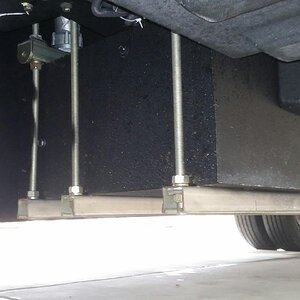Hey PartTimeRVer,
I have added track bars, stronger sway bars, front end work to the RV and she handles well now. Tires are fairly new and brakes have been checked as good. Engine and transmission are working excellent and milage is relatively low. All the fluids are changed on time. I do have all the required tow paraphernalia including an RVi3. We have towed a 4300 lb TJ around the west for several years and have experience with towing. I'm have a fair amount of mechanical experience and awareness and keep the rig in good running shape. We pack our rig light and understand the weight issues.
Notable facts for the build I propose.

Below is the manufacturers stats for the 31 foot version of my model. My RV is a 26 footer and interestingly my GVWR placard is listed as the same. My rig is sure to be lighter as I have 5 feet less structure at the back. That give me more tow capacity wieght wise. Also the 26 foot rig's frame extension is shorter than the one listed and probably handles the stress for towing better. The tow capacity is listed as 5k and I'm wanting to go only 1600 more lbs. My plan to add frame support and an upgraded hitch makes this idea of towing my Jeep a good possibility to be within the proper weight and safety issues.
I have 3 shops now that I have talked to but everyone is shutting down for the holidays so this job will be delayed until January. All the shops say this job is not unusual and relatively standard work. I am feeling confident this is going to work and work well.
Specs for 2008 Fleetwood - Tioga Ranger
Floorplan: 31W
(Class C)
Towing Capacity 5,000 lbs
GVWR 14,050 lbs.
PIC - Camping in the Alabama Hills near Lone Pine in the Eastern Sierra, Mount Whitney in the back ground












